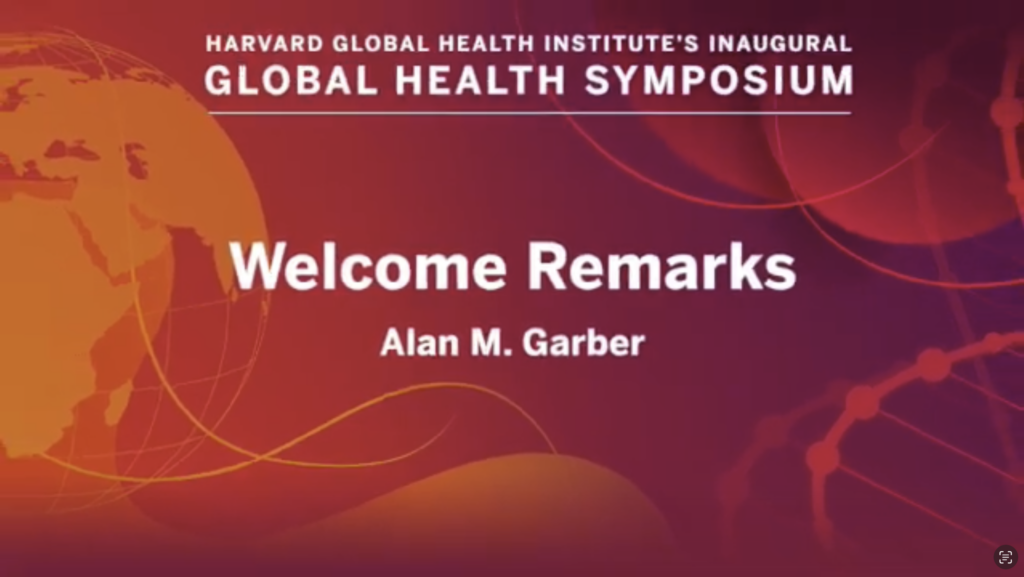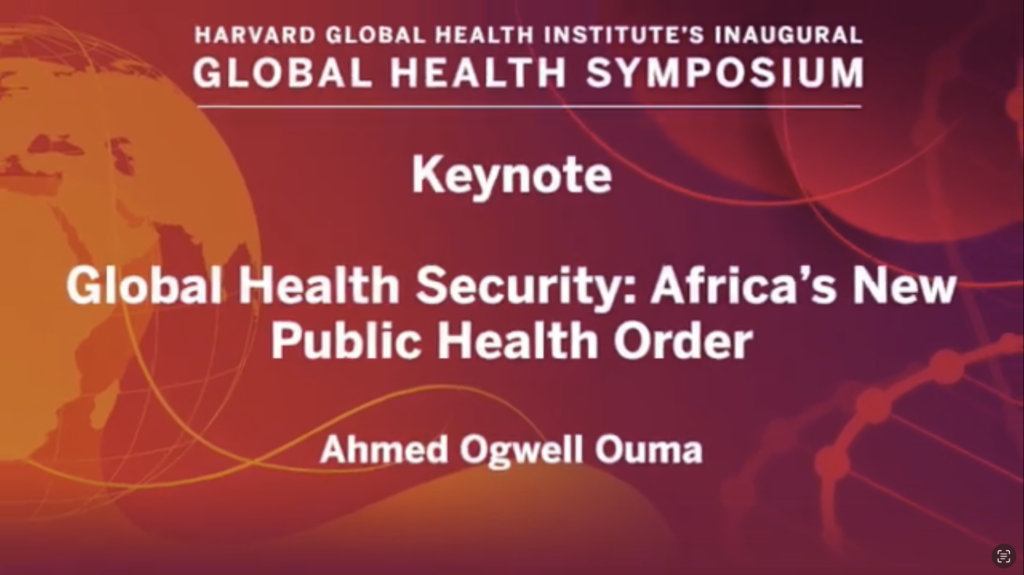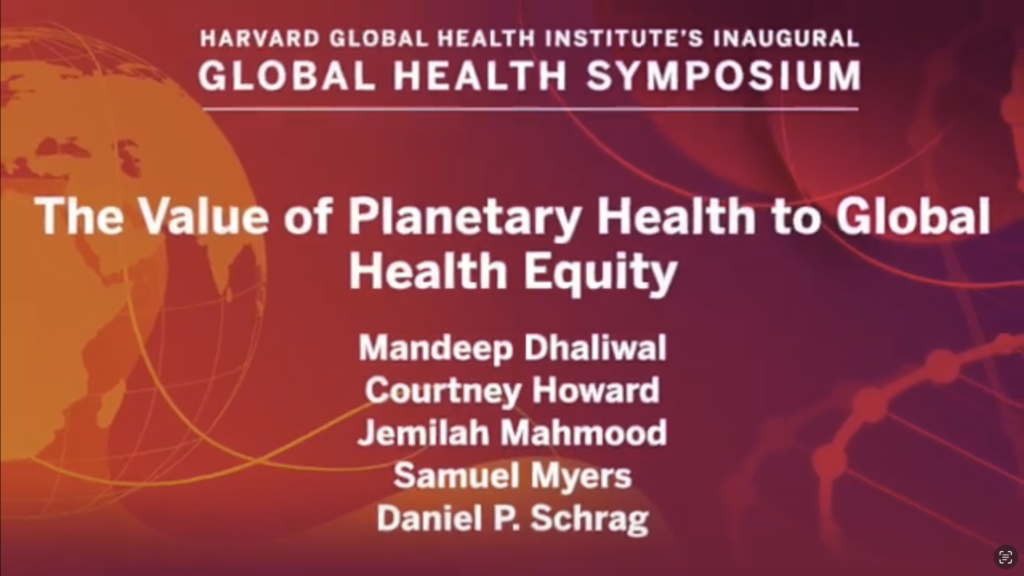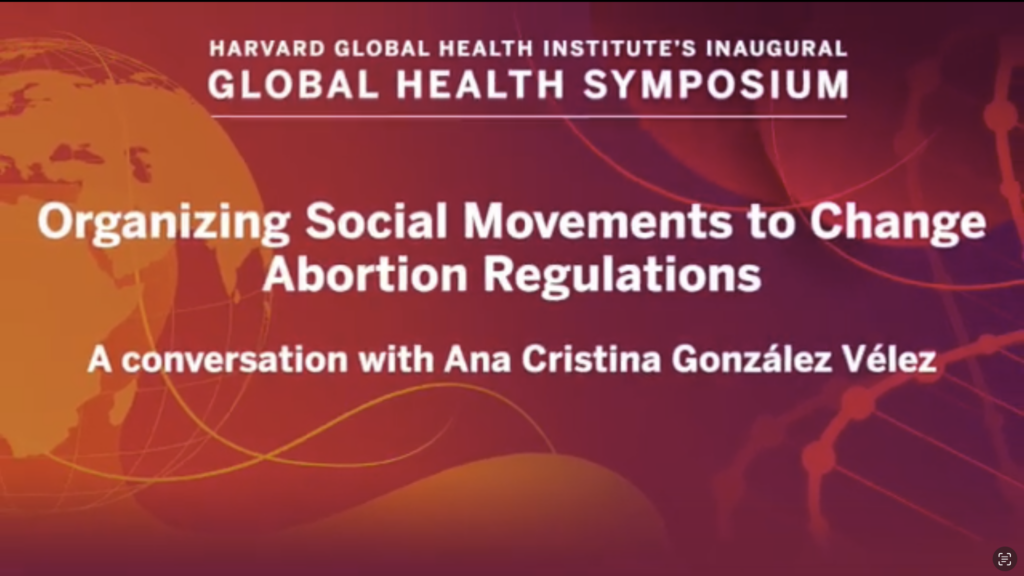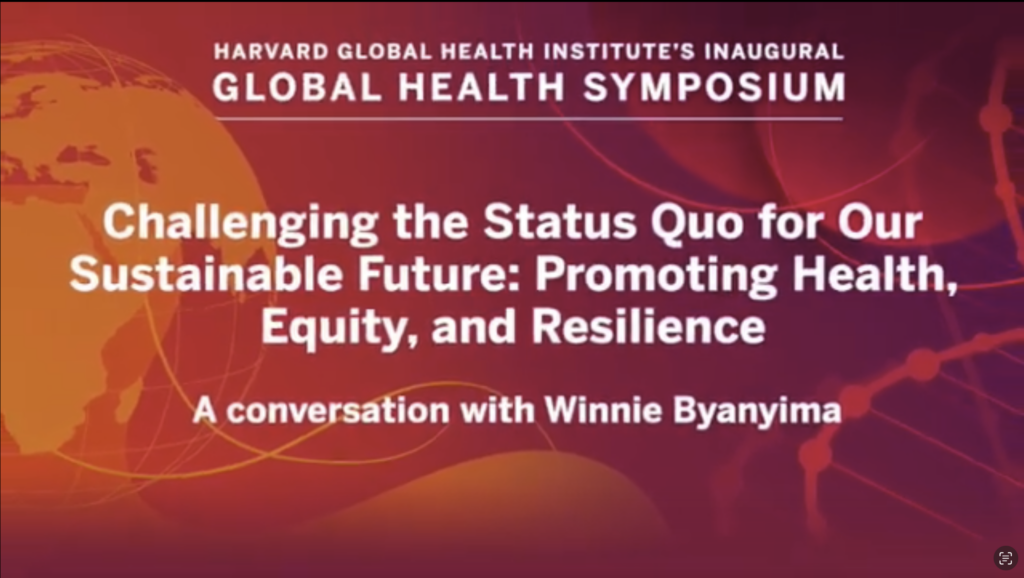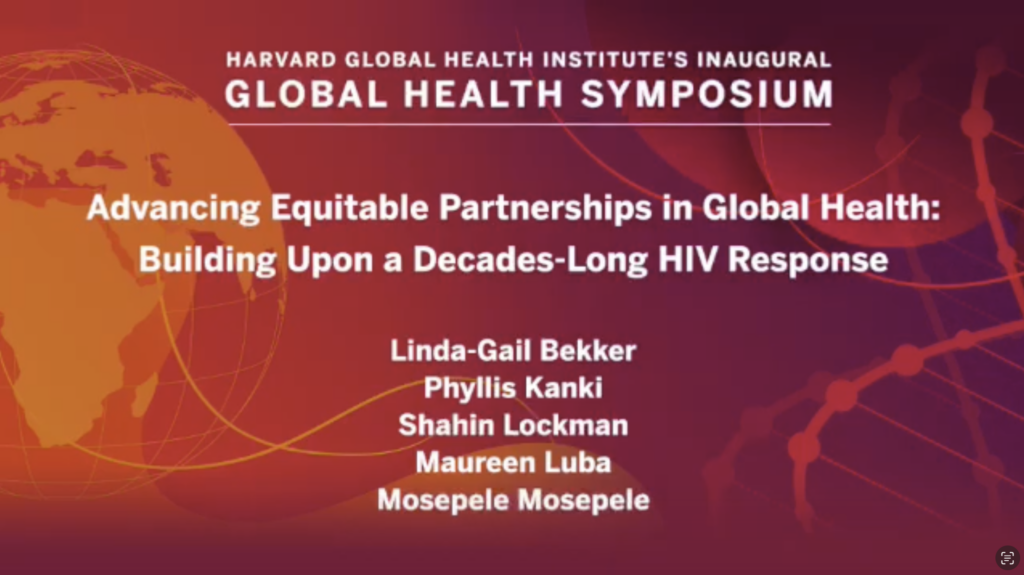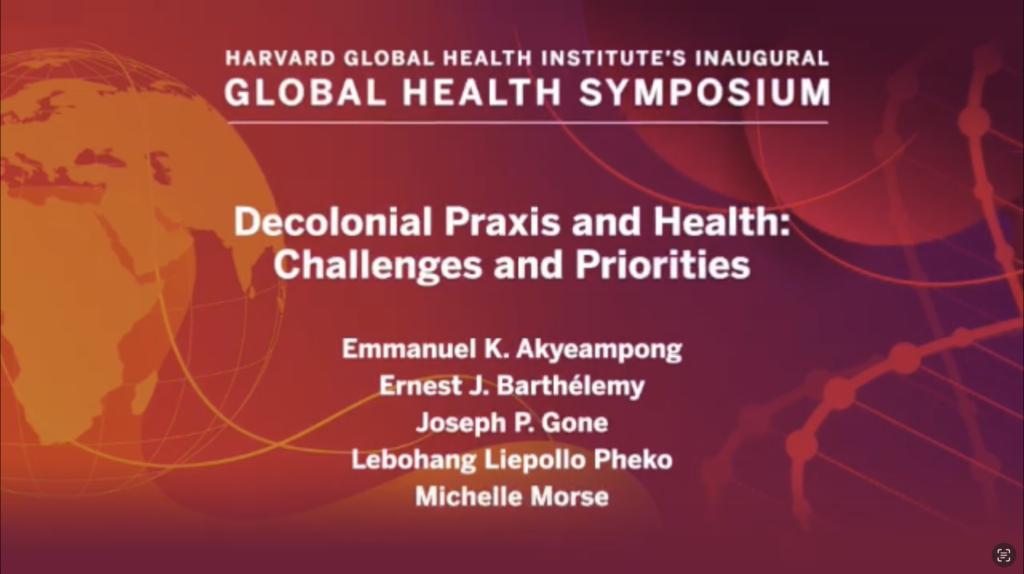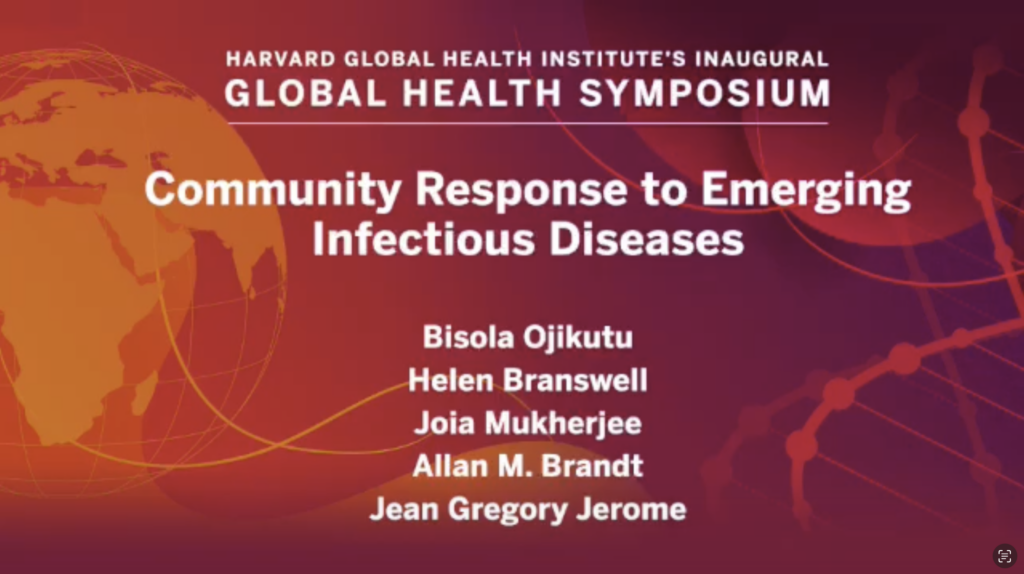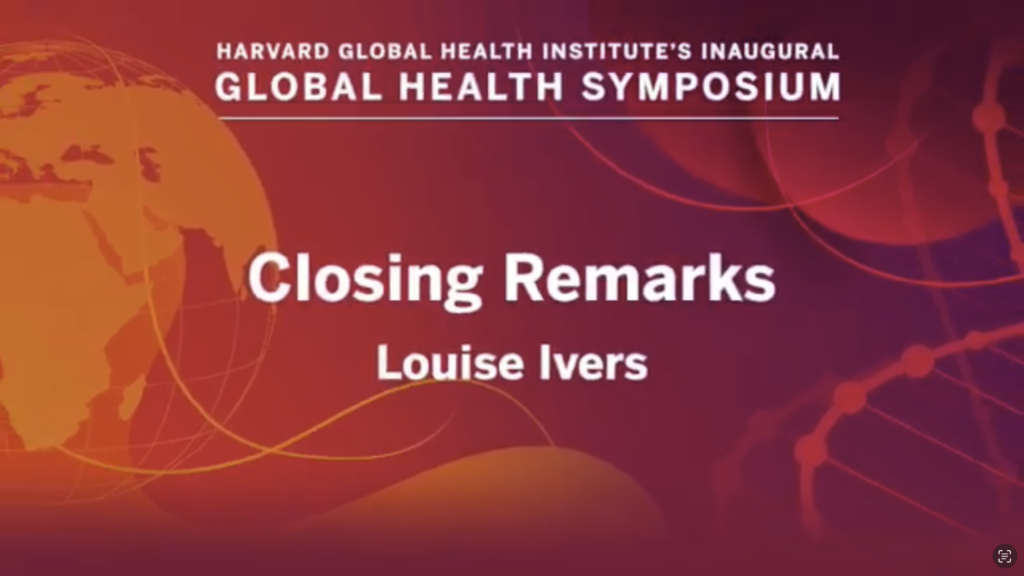Thank you to those who were able to join us live, whether in person or virtually.
The event was recorded and those recordings are available in our Video Highlights and on our Youtube page.
The Harvard Global Health Institute’s inaugural Global Health Symposium took place at the Harvard Faculty Club in Cambridge, MA on April 12th, 2023, with the theme of Global Health Equity through Community Engagement. The event featured nearly 30 global health experts, who joined in-person and virtually from around the world to speak on a wide range of global health issues across plenary sessions and fireside chats.
Dr. Ahmed Ogwell Ouma, Acting Director, Africa CDC, served as the event’s keynote speaker, highlighting Africa’s New Public Health Order.
Over 700 attendees from around the world joined the day-long event in-person or virtually.
Speakers will share their own perspectives; they do not speak for the university.
Thank you to those who were able to join us live, whether in person or virtually.
The event was recorded and those recordings are available in our Video Highlights and on our Youtube page.
Alan M. Garber, MD, PhD, Provost, Harvard University
Ahmed Ogwell Ouma, BDS, MPH, MPhil, Acting Director, Africa CDC
Hosted in partnership with the Planetary Health Alliance
Humanity’s footprint on Earth’s natural systems is changing our environment and affecting all dimensions of health including non-communicable disease, malnutrition, infectious disease, mental health, and exacerbating challenges around displacement and conflict. In short, the Earth Crisis is causing a global health and humanitarian crisis. Understanding and acting upon these urgent challenges call for massive collaboration across disciplinary and national boundaries to safeguard our health. Planetary Health is a solutions-oriented, transdisciplinary field and social movement focused on analyzing and addressing the impacts of human disruptions to Earth’s natural systems on human health and all life on Earth. In this session, leaders from three unique global health domains will speak to the value of the Planetary Health frame in addressing the health and development needs of the world’s most vulnerable populations.
Mandeep Dhaliwal, MD, Director of UNDP’s HIV, Health and Development Group
Courtney Howard, MD, Emergency Physician in Yellowknife, in Canada’s subarctic; Clinical Associate Professor, Cumming School of Medicine, University of Calgary
Jemilah Mahmood, MD, MO&G, Executive Director, The Sunway Centre for Planetary Health, Sunway University in Malaysia; Professor of Planetary Health, Sunway University
Samuel Myers, MD, MPH, Founding Director, The Planetary Health Alliance; Principal Research Scientist, Harvard T.H. Chan School of Public Health
Daniel Schrag, PhD, Sturgis Hooper Professor of Geology, and Professor of Environmental Science and Engineering, Harvard University; Director, Harvard University Center for the Environment
A conversation with Ana Cristina González Vélez
Ana Cristina González Vélez, MA, MD, PhD, Lecturer on the Right to Health, La Universidad de los Andes; Co-founder, La Mesa por la Vida y la Salud de las Mujeres and the Medical Group for The Right to Decide
Moderated by Alicia Ely Yamin, JD, MPH, PhD, Lecturer on Law and the Senior Fellow on Global Health and Rights, Petrie-Flom Center, Harvard Law School; Senior Advisor on Human Rights and Health Policy, Partners In Health
A conversation with Winnie Byanyima
Winnie Byanyima, MSc, Executive Director, UNAIDS
Moderated by Vanessa Kerry, MD, MSc, Founder and CEO, SEED Global Health; Director of the Program in Global Public Policy and Social Change, Harvard Medical School
Over the past 3 decades, the global community collaborated on a massive expansion of HIV diagnosis, care, treatment and prevention programs; scientific and research capacity and investigation; and community engagement around HIV. While much work remains to be done in HIV and not all communities benefited equally from these investments, 75% of people living with HIV globally are taking antiretroviral therapy, AIDS-related deaths have been reduced by 68% since the peak in 2004, and new HIV infections reduced by 54% since 1996. In this panel, we will discuss how partnerships that were created to address HIV can address other public health issues, and other lessons learned. For example, what are some the multi-faceted benefits and challenges of these partnerships? How should they be established and evolve, with equity as a guiding principle?
Linda-Gail Bekker, MBChB, DTMH, DCH, FCP, FCP(SA), PhD, Director, Desmond Tutu HIV Centre, University of Cape Town; Chief Executive Officer, Desmond Tutu Health Foundation
Phyllis Kanki, DVM, DSc, Professor of Immunology and Infectious Disease, Harvard T.H. Chan School of Public Health
Shahin Lockman, MD, MSc, Associate Professor, Brigham and Women’s Hospital and Harvard T.H. Chan School of Public Health; Joint PI, Botswana Clinical Trials Unit, Botswana Harvard AIDS Institute Partnership
Maureen Luba, BA, MSc candidate, Program Manager, Cooper Smith
Mosepele Mosepele, MD, MSc, Associate Professor of Medicine & Infectious Diseases, Faculty of Medicine, University of Botswana; Deputy Coordinator, Botswana National COVID-19 Task Force
Hosted in partnership with the Division of Global Health Equity at Brigham and Women’s Hospital
A loosely connected movement has recently emerged to challenge racism and ongoing coloniality in the conception and practice of global health. But criticism of this movement has also surfaced, highlighting reformist initiatives that leave power dynamics and racialized hierarchies unchallenged, the selective incorporation of decolonial principles, and the overrepresentation of institutions and voices from contexts that have accrued advantages from colonial domination and resource distribution. This panel will both explore the challenges confronting an anticolonial movement for health justice and identify decolonial and antiracism approaches with constructive potential.
Emmanuel K. Akyeampong, PhD, Oppenheimer Faculty Director, Harvard University Center for African Studies; Ellen Gurney Professor of History and of African and African American Studies, Harvard University
Ernest J. Barthélemy, MD, MPH, MA, Division Chief of Neurosurgery, SUNY Downstate Health Sciences University; Founding President, The Society of Haitian Neuroscientists
Joseph P. Gone, PhD, Professor of Anthropology and of Global Health and Social Medicine, Harvard University; Faculty Director, Harvard University Native American Program
Michelle Morse, MD, MPH, Chief Medical Officer and Deputy Commissioner, Center for Health Equity and Community Wellness, NYC Department of Health and Mental Hygiene; Assistant Professor, Harvard Medical School
Lebohang Liepollo Pheko, Senior Research Fellow and Political Economist, Trade Collective
Hosted in partnership with Partners In Health
In this session panelists will discuss engaging impacted communities in responses to infectious diseases, including to COVID-19, HIV, TB, Ebola, cholera, among others. From Boston to Haiti, Sierra Leone, Peru, Lesotho, and beyond, we’ll explore the importance and challenges of engaging trusted community leaders, of utilizing emergency response efforts to build essential services for establishing resilient health systems for the long term, and of centering care resource coordination and social supports at the heart of response efforts.
Helen Branswell, Senior Writer, STAT News
Allan M. Brandt, PhD, Amalie Kass Professor of the History of Medicine and Professor of the History of Science, Harvard University; Interim Chair, Department of Global Health and Social Medicine, Harvard Medical School
Jean Gregory Jerome, MD, MPH, Senior Advisor on Health Systems Strengthening, Partners In Health
Joia Mukherjee, MD, MPH, Associate Professor of Medicine, Division of Global Health Equity, Department of Medicine, Brigham and Women’s Hospital; Associate Professor of Global Health and Social Medicine, Harvard Medical School
Bisola Ojikutu, MD, MPH, Executive Director, Boston Public Health Commission; Associate Professor of Medicine, Harvard Medical School; Faculty, Division of Global Health Equity, Brigham and Women’s Hospital
Louise Ivers, MB, BCh, MD, MPH, DTM&H, Director, Harvard Global Health Institute; Director, Massachusetts General Hospital Center for Global Health; David Bangsberg MD, MPH Endowed Chair in Global Health Equity, Mass General Hospital; Professor of Global Health and Social Medicine and Professor of Medicine, Harvard Medical School
Speakers will share their own perspectives; they do not speak for the university.
For questions, please email HGHI_Programs@harvard.edu. Thank you.
